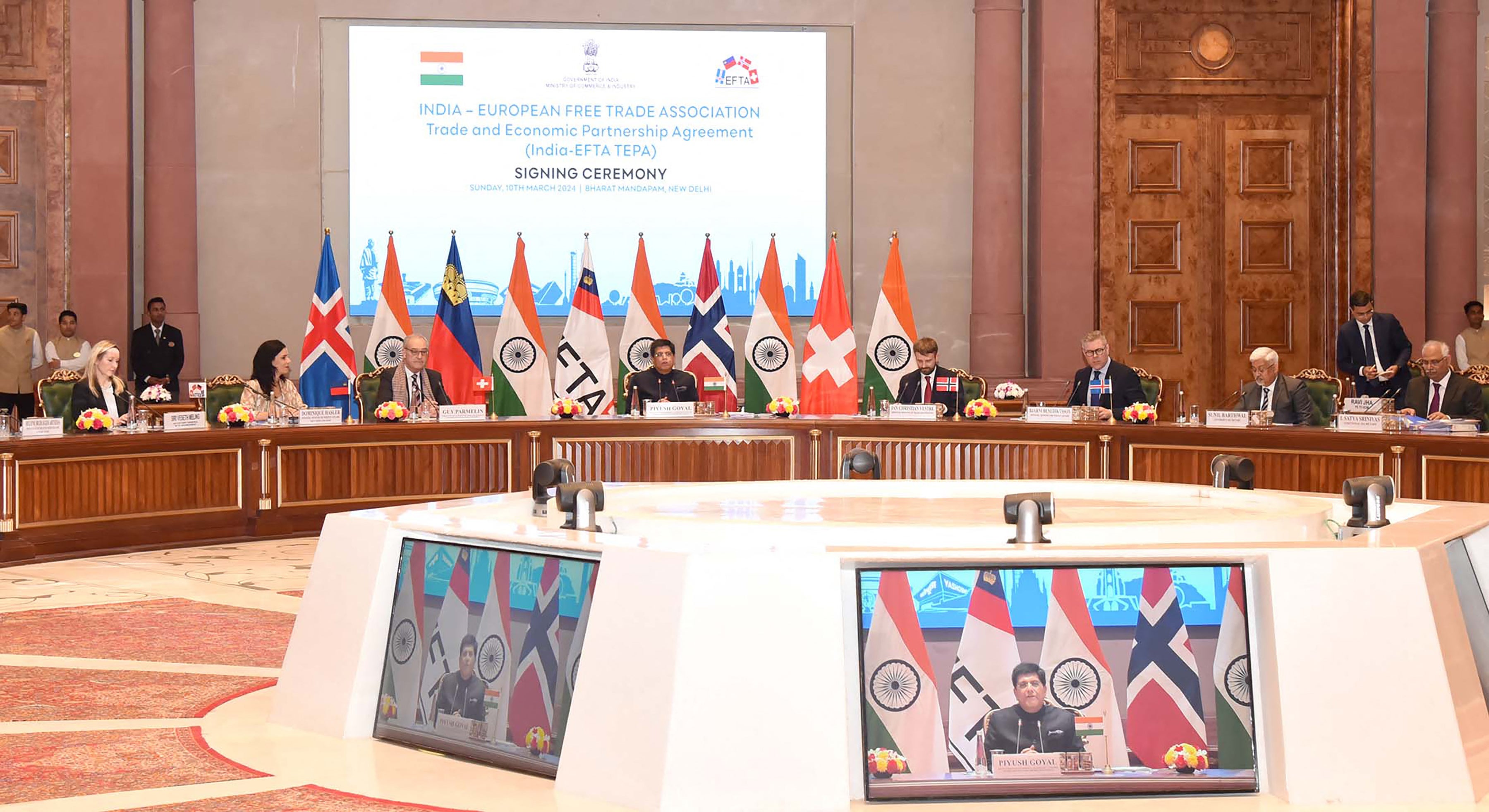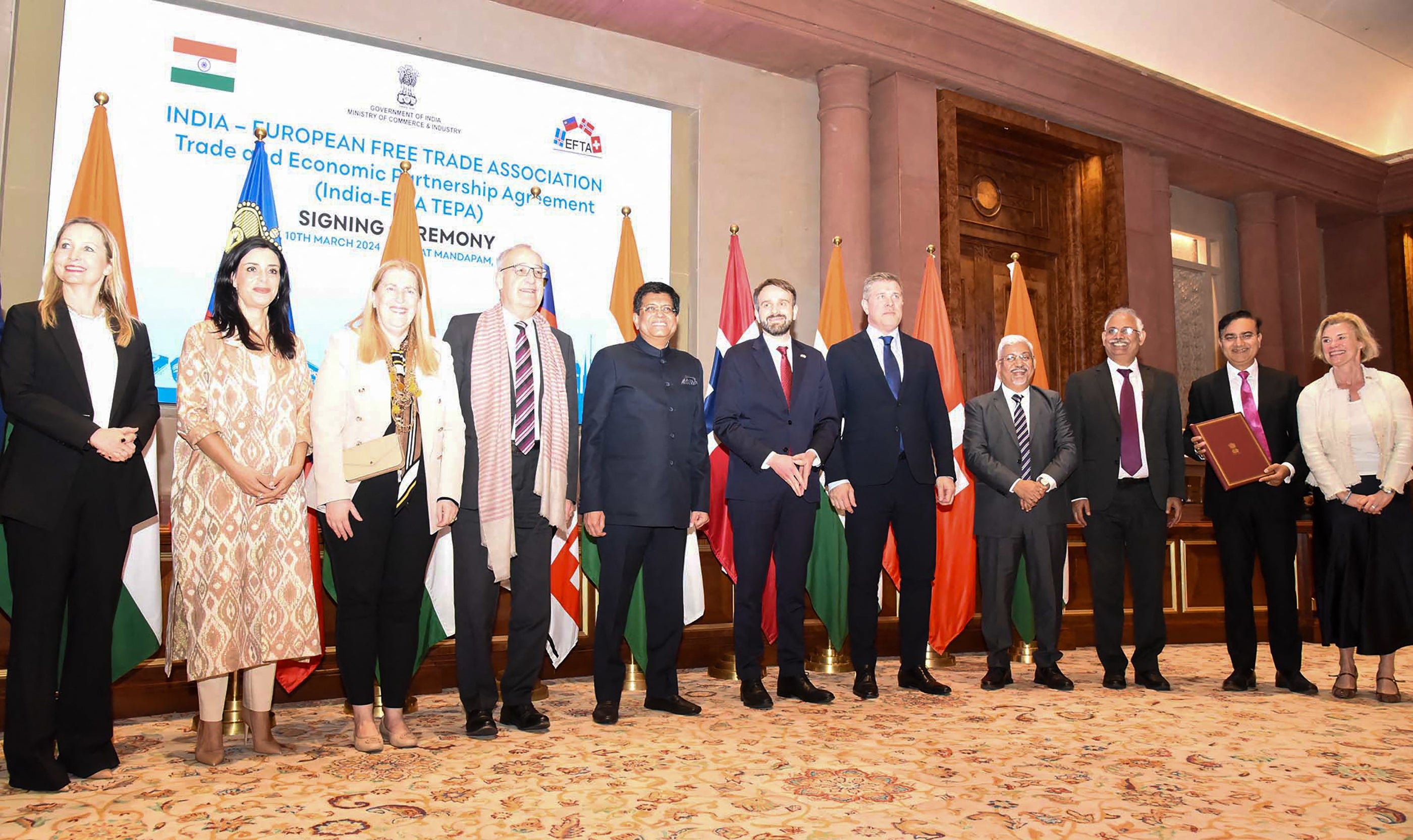India signs $100bn trade deal with four European countries as UK talks drag on
Modi calls deal a ‘watershed moment’ with just weeks to go before India’s general election

With the UK still struggling to iron out the details of a post-Brexit free trade agreement with India, New Delhi has instead clinched a landmark deal with four European nations that it claims will result in $100bn (£78bn) of investment in the country.
Sunday’s agreement was signed between India and the European Free Trade Association (Efta) bloc of non-EU nations – Norway, Switzerland, Iceland and Liechtenstein – after 16 years of negotiations. The EU is also engaged in a race to reach its own trade deal with India.
Under the deal, the four European countries will invest $100bn in India over the next 15 years and create a over million jobs.
In return, India will lift or partially remove what are currently very high customs duties on industrial goods from the four countries.
The deal was unveiled by the Narendra Modi administration at a summit in New Delhi with just days to go before the expected start of the general election campaign season, during which the Indian government is prohibited from making major announcements that could be vote-winners. India is due to hold its elections by mid-May, though the exact dates have yet to be released.
Mr Modi said the conclusion of what he called “one of the most pioneering free trade agreements ever” was a “watershed moment”.
“This landmark pact underlines our commitment to boosting economic progress and creating opportunities for our youth,” he said. “The times ahead will bring more prosperity and mutual growth as we strengthen our bonds with Efta nations.”
It means India has now signed three trade deals in the past two years, with Australia, the UAE and now the Efta bloc, while negotiations for a UK-India free trade agreement that would double trade to £86bn are frozen in the final stages after some 14 rounds of talks. With the UK also going to the polls later this year, a deal is now not thought to be likely before both countries have formed new governments.
Indian trade minister Piyush Goyal said the deal with the European bloc marked the “first time in the history of the world that we are inking an agreement with a binding commitment” for investment. He claimed that it shows “investor confidence in India is at an all-time high”.
The pact covers some new elements, such as intellectual rights and gender equality, Mr Goyal added, telling a press conference: “It is a modern trade agreement: fair, equitable, and win-win for all five countries.”
The agreement will provide advantages to the pharmaceutical and medical devices sector within the bloc. Indian exporters will enjoy expanded access for their rice and other goods to European nations, while high-end Swiss watches will gradually become more affordable in India.
Swiss machinery manufacturers, producers of luxury goods, and transport sectors are anticipated to gain, according to the Swiss government. India has extended an invitation to Swiss transport companies to invest in its railways.
The agreement gives Efta nations the chance to export processed food and beverages, electrical machinery, and various engineering products to a potential market of 1.4 billion people at reduced tariffs.

India and the four Efta nations now have to ratify the agreement before it can take effect. Switzerland is expected to ratify it by next year.
Analysts said the pact may not immediately help India to reduce a large trade gap with the European bloc, but that it will help to draw investment into key industries.
“The trade agreement will help attract investment in critical sectors like medical devices [and] clean energy, and expand exports to other countries by accessing Swiss and [Norwegian] technologies,” said trade economist Ram Singh, who heads a New Delhi think tank, the Indian Institute of Foreign Trade.
Negotiations for a UK-India deal, billed as the most comprehensive ever signed by New Delhi, were formally launched in January 2022, and the British prime minister at the time, Boris Johnson, declared that he expected it to be completed by Diwali – 24 October – that same year.
Hopes for a breakthrough were high and there were talks of plans for a Diwali visit to the UK by Mr Modi to sign the deal, until comments criticising Indian migrants by the then home secretary Suella Braverman appeared to derail negotiations. Progress again stalled in April 2023 amid New Delhi’s anger over protests at its embassy in London.
British negotiators flew to India last week in what one UK government source described as a last-ditch attempt to clinch a deal. The two sides still differ on a number of points, including the number of visas for Indians to work in the UK and differences over the level of access British car manufacturers should be given to India’s market.
The UK’s trade minister, Kemi Badenoch, said last week that an agreement before both countries’ elections is possible but challenging, adding that she does not wish to “use any election as a deadline”. She said one of the major reasons for the long-drawn-out discussions is that India is a “protectionist economy” in comparison with the UK’s more liberalised regime.
Talks for an ambitious FTA between India and the EU were resumed in 2021 after being stalled for almost nine years due to differences in issues of customs duties on motor vehicles and spirits, and around the movement of professionals. The EU is India’s second-largest trading partner after the US.
Meanwhile, earlier this year, Canada paused talks for an FTA with India after the two sides were unable to reach agreement on issues around food safety standards. It also came amid a diplomatic row between the two countries after Ottawa said it believed the Indian government had been involved in a plot to assassinate a Canadian Sikh activist in British Columbia.
Join our commenting forum
Join thought-provoking conversations, follow other Independent readers and see their replies
Comments
Bookmark popover
Removed from bookmarks